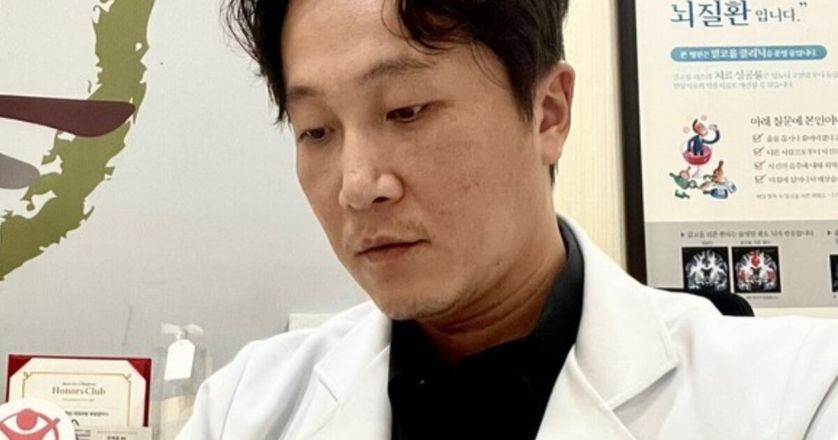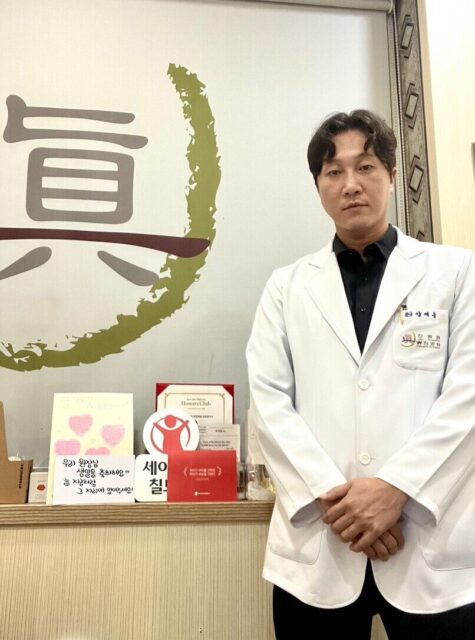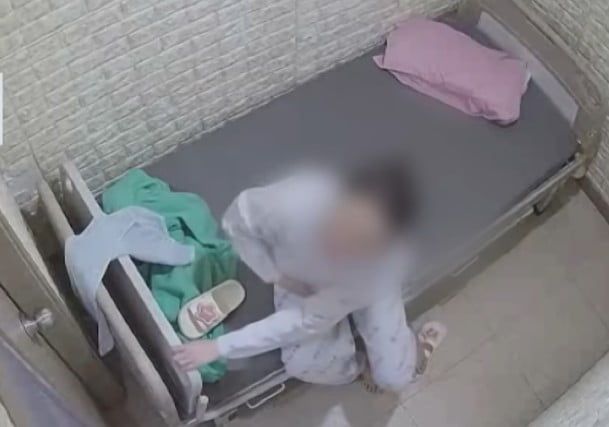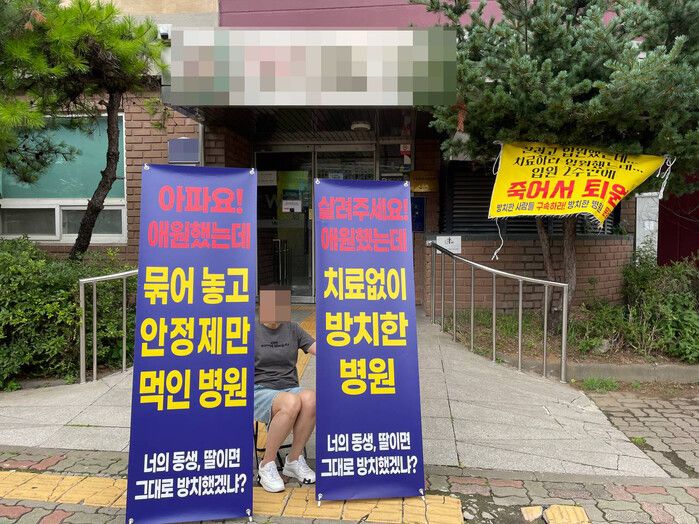EXID Hani’s Troubled Psychiatrist Fiancé Breaks Silence In Exclusive Interview About The Death Of His Patient

Psychiatrist Yang Jae Woong, better known to K-Pop fans as EXID member Hani‘s fiancé, finally broke the silence and spoke to Hankyoreh in an exclusive interview explaining the scandalous death that took place at his W Jin Hospital.
The death of Yang’s patient, who had been hospitalized for a little over two weeks to treat an addiction to diet pills containing narcotics, received a tremendous amount of attention from the public—especially after Dispatch interviewed the late patient’s grieving mother.
Amid fierce backlash, Yang and Hani even pushed their wedding back.
EXID’s Hani And Yang Jae Woong Delay Their Wedding Following His Medical Malpractice Scandal
Now, in his interview, Yang claimed that the hospital did apologize, even though all actions taken with the late patient were believed to have been needed and not excessive. Yang also insisted the lack of communication with the bereaved was due to the threats made against the hospital.

Q. A person has lost their life. Does the hospital acknowledge any responsibility?
Yang: This is a very unfortunate and regretful incident. As the hospital director, I feel a deep sense of responsibility. We are continuously reflecting on the systemic aspects, including the steps that were taken during the emergency situation, and the oversight regarding the patient’s condition, to ensure that this does not happen again. However, I do not believe, as exaggeratedly expressed in the media, that the medical staff intentionally neglected the patient.
While the expression “intentional” may not be appropriate, I understand that some media outlets have reported headlines like “Neglected Patient Passes Away.” From my perspective as the hospital director, the term “neglect” could be interpreted as implying that the staff, despite knowing their responsibilities, carelessly attended to the patient. However, I believe that is not the case, which is why I felt it necessary to clarify this. I think this issue is on a different level than whether there was “negligence” or not.
Some details about the treatment that the late patient received were disclosed. In sharing these details, Yang commented that he, himself, had not seen the late patient because he only provided outpatient care.
Q. Did you, Director Yang, personally interview or check on the victim during their hospitalization? According to the medical records, the same three procedures—isolation, medication, and restraint directives—are repeatedly noted. How many face-to-face consultations did the attending physician have with the deceased patient during their hospitalization, and how much time was spent on those consultations?
Yang: I do not handle hospitalized patients; I only provide outpatient care. The ward is managed by a team of three psychiatrists, including one attending physician and two department heads, who are responsible for their respective patients’ treatment and care. If outpatient treatment is needed after discharge, it continues with the respective attending physician. In the outpatient setting, there are four specialists, including myself. One gastroenterologist provides consultation for hospitalized patients alongside outpatient care.
As with all attending physicians and patient relationships, but especially in psychiatry, the rapport between the patient and doctor is crucial. Once treatment begins with an attending physician, it is not easy for another doctor to intervene. Generally, those who wish to see me come to my hospital by making an appointment for my outpatient services.
The hospitalization process occurs through two pathways: It may proceed from outpatient treatment if needed or patients may come directly for admission from the start. In the case of the deceased, the late patient (Park)’s mother, she came to the hospital thinking about admission from the beginning, without any outpatient consultation with me or other specialists, and the admission was carried out after meeting another attending physician.
Q. What are the indications for isolation and restraint at W Jin Hospital, specifically the reasons or grounds for requiring certain treatments or procedures?
Yang: We follow the Ministry of Health and Welfare’s guidelines on isolation and restraint. Indications include situations where there is a significant risk of self-harm or harm to others, when there is a high concern that the patient may seriously jeopardize their own health both mentally and physically, when there is a considerable risk of property damage or serious disruption to the ward environment, when it is necessary to reduce excessive stimuli related to the illness to decrease the risk of self-harm or harm to others, and when the patient feels they are unable to control their impulses and requests isolation or restraint.
The inpatient attending who actually treated the late patient claimed there were “psychotic symptoms” and “risk to others” observed—which led to restraining.

Q. Was there actually a risk of self-harm or harm to others that warranted the use of isolation and restraint on the deceased patient? We understand that isolation and restraint were implemented right before the death due to the patient soiling themselves. Is that correct?
Attending: On May 24 at 6 PM, during the first isolation, the patient was reported to be causing a disturbance in the ward, saying, “I can’t get in touch with my mother, please help,” and exhibited violent behavior by pulling the nurse’s hair and getting angry with the aides. As a result, isolation was carried out. After 6:45 PM on May 26, the patient was found wandering around the room and shower area while soiling themselves, yelling at other patients taking showers, and pushing them when they complained, which led to the placement in the isolation room as they were uncooperative.
Yang: Around 6:51 PM on May 26, the CCTV footage from the isolation room shows another patient entering and seemingly hitting the deceased patient’s legs, throwing clothes, and yelling. The nursing staff believed that the isolation was also necessary for Park’s protection from other patients.
Attending: At 12:30 PM on May 27, the use of restraint was implemented due to suspected psychotic symptoms and indications of risk to others. Additionally, there was a lack of stability in the patient’s bed, posing a fall risk, which necessitated the restraint.
Regarding the amount of medication administered, which, at one point, the Korean media highlighted as being enough to take down an elephant, Yang stood his ground and said it was within the prescription (and assumed, therefore, acceptable).
Q. At around 8:40 PM on May 26, two nursing assistants administered about three pills. And then, at 9:43 PM, three nursing assistants administered medication in three separate instances. From this point on, the patient appeared to be disoriented. As the patient continued to show signs of instability, restraints were applied, and less than two hours later, the restraints were removed, but the patient ultimately passed away. This medication is not recorded in the medical records; what was this medication?
Yang: I understand it to be a regularly prescribed medication as per the standard orders, and medications that are already prescribed are not documented in the patient care records.
Yang did admit to the poor quality of CPR administered and promised “more detailed training sessions.”
Q. The CCTV footage shows the medical staff’s CPR efforts for the deceased just before their passing were incorrect.
Yang: We have been conducting training once a year for the medical staff on CPR and the use of defibrillators, led by the department head. Nevertheless, it seems that we were unprepared for this unfamiliar medical emergency. We plan to continue and conduct more detailed training sessions.
As for the bereaved’s claim that Yang had not apologized, though, both Yang and the attending had a conflicting answer. In particular, Yang said that he was a bit taken aback by the bereaved’s behavior toward the hospital.

Q. Given that a fatal accident occurred, shouldn’t at least one of the attending physician or the hospital director have met with the family to explain and apologize? Why was there no apology?
Attending: On the day of the incident, May 27, I personally explained the situation to the mother and brother and conveyed my apologies and condolences.
Yang: I heard that before I arrived at the hospital on May 27, the family visited. The attending, the head nurse of the ward, and the head of administration met with the mother, who was the primary caregiver, to express their apologies and condolences. I was informed that the mother acknowledged this and left. Additionally, the attending conveyed condolences not only as the responsible doctor but also on behalf of the hospital.
However, that evening, I heard that the father and a man claiming to be a reporter, along with another man, came to the hospital demanding CCTV footage and made threats such as, “We will spread this to the media” and “We will get this hospital shut down,” which made our staff feel threatened. After that, although I am the hospital director, it felt precarious for me, as someone not directly involved in the case, to approach and offer my apologies and condolences. I was informed that on June 4, the mother had scheduled another meeting with the attending, and I had intended to meet her as well, but she did not come to the hospital that day, so I was unable to meet her in person.
Before ending the interview, Yang acknowledged that his decision to issue an apologetic statement via his management might have seemed inappropriate—but that it was “deemed necessary.” Continuing to express condolences, Yang asked fellow psychiatrist to not let the late patient’s death (and the media attention he and his hospital received) hinder them from providing the psychiatric help the public needs.
Q. You apologized through your agency, Mystic Story. There are criticisms that the apology was inappropriate.
Yang: The statement was released through Mystic Story because, as news began to spread by entertainment reporters and platforms, it became a difficult situation for the company and those around me. The entertainment news department now views me through the lens of an entertainer rather than a hospital director, so it was deemed necessary to issue a statement in that context.
Q. Do you have any words you would like to convey to the bereaved family? Are there plans for further apologies?
Yang: As the hospital director and, more importantly, human, I would like to express my heartfelt condolences for the loss of Park, a daughter and sister to the bereaved. I sincerely apologize for not being able to ensure a healthy recovery and for the resulting death. I hope to have the opportunity to convey my apologies to the family without media exposure.
Q. Is there anything else you would like to say?
Yang: The W Jin Hospital has received many certifications and recognitions, including the Ministry of Health and Welfare Award, after undergoing an accreditation evaluation in 2017 as a designated specialized hospital for alcohol addiction. However, a patient has died. For whatever reason, a person has died in a hospital that should be focused on saving lives and promoting recovery. Therefore, we will strive to improve the quality of care and our systems internally.
I extend my deepest apologies to the bereaved family once again. Many mental health hospitals have closed since COVID-19. I am concerned that this incident may lead to an increase in negative perceptions of mental health hospitals, resulting in psychiatrists and facilities avoiding patients with addictions and shying away from admissions. I sincerely hope that this tragic death will not be generalized and judged through a biased lens.
According to the original interview, Yang does not seem to have been asked about his relationship with Hani and/or the postponed wedding.
Read the late patient’s mother’s interview with Dispatch here.